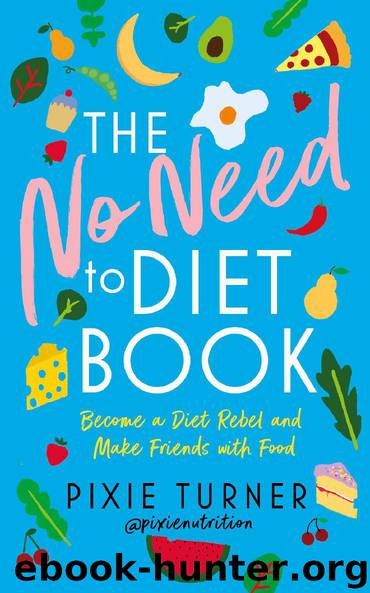The No Need to Diet Book by Pixie Turner

Author:Pixie Turner [Turner, Pixie]
Language: eng
Format: epub
ISBN: 9781788547178
Publisher: Head of Zeus
Self-esteem and social comparison
Social media and self-esteem are tightly intertwined. Positive feedback on your profile seems to enhance social self-esteem and well-being, whereas negative feedback seems to decrease self-esteem and well-being. 101 In contrast, viewing your own profile appears to increase self-esteem. 102 It seems that the more emotionally invested you are in your social media accounts and profiles, the more they affect your self-esteem, so people who feel a strong emotional connection to social media are most at risk.
The negative impact of social media on self-esteem seems to be mediated by social comparison. Social comparison is the tendency to compare yourself with others on specific attributes, and we are more likely to compare ourselves with someone we think is similar to ourselves – our peers.
Evolutionarily, throughout history we have compared ourselves with a small number of people within our social environment, i.e. people within our tribe or small social circle. The rise of social media has drastically shifted who we consider our peers and who we therefore compare ourselves with. Our ancient brain hasn’t had time to adapt to this new social environment, which has only been around for the last 10 years or so (Instagram launched in 2008).
The prefrontal cortex in our brains is most associated with higher cognitive functions such as critical thinking, and is moulded by our environment up until the age of around 25. Now that almost every young person is on social media, and follows a variety of people, including friends, celebrities and influencers, the Instagram feed is interpreted as reality and helps shape this social comparison. This means the brain can’t tell the difference between your neighbour or an Instagram model, and they are interpreted as peers of the same social group and therefore a reasonable target for comparison. Naturally, this doesn’t bode well.
People are far more likely to make upward social comparisons on social media compared with real life. Upward social comparisons are when we compare ourselves with other people who we perceive as being slightly better than us or who we look up to in terms of certain characteristics, whether it’s appearance, fitness or academic grades. For example, although you likely won’t compare yourself to Albert Einstein, you will compare your grades with those of others in your class, especially those who you perceive to be on a similar or slightly higher level to you. Although upward comparison can be beneficial when it encourages ambition and inspires people to become more like the people they admire, more often than not it has a negative effect.
How does this relate back to self-esteem? Online, you can take your time to strategically construct a persona that emphasises your most desirable traits and hides any flaws, whereas face-to-face interactions do not allow for the same degree of contemplation or flexibility. On social media, people are far more likely to only share the best aspects of their lives and treat it like a highlight reel. Viewing others’ carefully constructed profiles that show a highlight reel of positives appears to diminish our own self-worth.
Download
This site does not store any files on its server. We only index and link to content provided by other sites. Please contact the content providers to delete copyright contents if any and email us, we'll remove relevant links or contents immediately.
The Bone Broth Miracle: How an Ancient Remedy Can Improve Health, Fight Aging, and Boost Beauty by Ariane Resnick(16610)
How to Be a Bawse: A Guide to Conquering Life by Lilly Singh(7486)
The Fat Loss Plan by Joe Wicks(4920)
The Ultimate Bodybuilding Cookbook by Kendall Lou Schmidt(3945)
The French Women Don't Get Fat Cookbook by Mireille Guiliano(3661)
A Jewish Baker's Pastry Secrets: Recipes from a New York Baking Legend for Strudel, Stollen, Danishes, Puff Pastry, and More by George Greenstein(3598)
Better Homes and Gardens New Cookbook by Better Homes & Gardens(3590)
Super Food Family Classics by Jamie Oliver(3416)
Dinner in an Instant by Melissa Clark(3162)
Bread Revolution by Peter Reinhart(3139)
Tom Kerridge's Dopamine Diet: My low-carb, stay-happy way to lose weight by Kerridge Tom(3110)
Body Love by Kelly LeVeque(3058)
Ottolenghi - The Cookbook by Yotam Ottolenghi(2944)
Flavor Flours by Alice Medrich(2865)
Tone Your Tummy Type by Denise Austin(2845)
The Fat Chance Cookbook by Robert H. Lustig(2836)
Oh She Glows Every Day by Angela Liddon(2780)
LL Cool J's Platinum 360 Diet and Lifestyle by LL Cool J(2736)
The Kitchen Counter Cooking School by Kathleen Flinn(2520)
